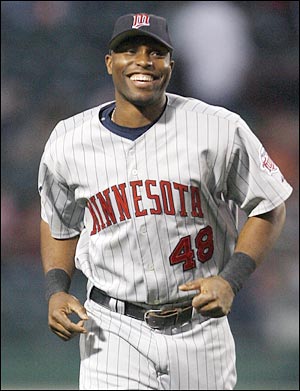 With baseball’s revenues soaring, we figured this year’s free agents would do very well for themselves on the open market. And, well, we were right. But how can we put these numbers into context?
With baseball’s revenues soaring, we figured this year’s free agents would do very well for themselves on the open market. And, well, we were right. But how can we put these numbers into context?
Over the past couple winters, analysts have repeatedly pounded teams for throwing multi-year, huge-money contracts at supposedly undeserving players. But this criticism hasn’t always been valid. Derek Lowe’s four year, $36 million deal, vilified at the time, actually looks incredibly prudent three seasons in.
In other words, we need to re-calibrate, and it’s becoming tougher and tougher as the industry continues to expand. Torii Hunter seems to have scored a deal that he can’t possibly live up to, but what if baseball pulls in $8 billion dollars in 2010? What level of performance will be worth $18 million in that environment? It’s tough to say.
Keep in mind that MLB’s free agent system heavily favors the players, as there are almost always more buyers than sellers. Combine that with the closed, competitive auction-type atmosphere, and players will almost surely pull in more than their marginal revenue product (MRP).
Often times, this dynamic leads to the signing team suffering from the winner’s curse. But more and more, as revenues continue to rise, players will actually make less than their MRPs in the last years of their deals (e.g. Barry Bonds’s first contract with the Giants).
So where does all this leave us with the current batch of free agent signings? As I’ve said before, it’s difficult to analyze any specific deal without doing a thorough report on the individual team’s finances (which we can’t do, since this information remains proprietary). But there are a few quick litmus tests we can put them through:
- Is this player likely to make his team significantly better in 2008?
- Is this player’s performance likely to hold up at a reasonable level through the life of the contract?
- Could the team have found the same level of performance in 2008 at a lower price?
- Could the team have improved itself more in 2008 by using that money in other areas?
- Will the contract hurt the team’s ability to compete in the future?
I would say, in a general sense, if a contract fails even one of these tests, it is probably not a great deal.
With that said, let’s look at some of the deals from the past couple weeks:
- Torii Hunter. Being generous, Hunter passes 1, 2, 3, and 5, but only #1 is relatively certain. He does not pass #4. The Angels need offense, badly. While Hunter has hit well enough the past few seasons, he is not the middle-of-the-order masher the Angels could really use, particularly in the DH spot. Will he make the team better? Certainly, but the law of diminishing returns says the Angels should have spent that money in more needy areas than centerfield defense and mild pop.
- Alex Rodriguez. All things considered, this will end up being a 10 year, $305 million deal, and I think you have to give it a thumbs up for both sides. This is a pretty simple exercise. A-Rod is a great player who will vastly improve the Yankees’ chances of contending for the majority of the contract, and would be almost impossible to replace in 2008.
- Francisco Cordero. Being a power reliever, Cordero fails 2, 3, and 4 almost by default. As we’ve said, relievers can be found and/or made. Using valuable resources on one, particularly when your team is not likely to contend, is a waste. I won’t even run Scott Linebrink through these tests.
The advantage of these tests is that they take the focus off the dollars (which are completely contextual numbers in a perpetually dynamic environment), and instead on the player’s merit. Alex Rodriguez is a great player to have around. As long as his deal doesn’t hamstring your future efforts (which it almost certainly won’t, given the Yankees’ means), his contract will likely be a good one. Francisco Cordero should be effective in 2008 and possibly beyond, but there certainly more important areas the Reds could have spent these resources on.
Later in the week, we’ll look at players on the market yet unsigned, and see which might be the best bets.
Feedback? Write a comment, or e-mail the author at shawn(AT)squawkingbaseball.com
Add New Comment